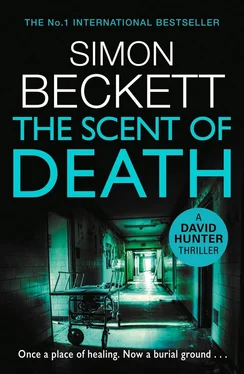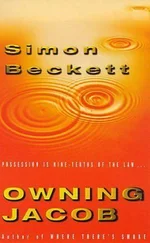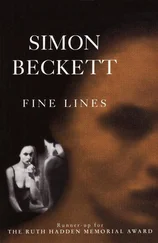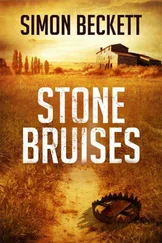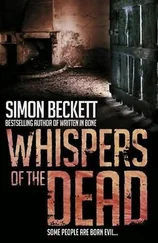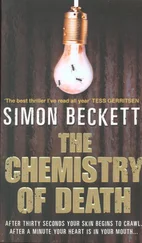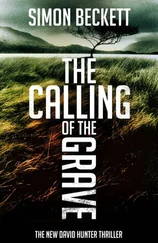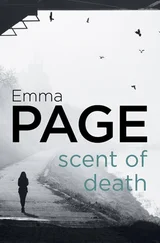‘I can see that. Oh, and that freelance journalist’s emailed again. Francis Scott-Hayes.’
I sighed. Scott-Hayes had been pestering me for an interview for weeks, emailing both me and the department in the hope of a response. Or rather, the response he wanted. I’d politely declined his first request, less politely refused the second and ignored his subsequent emails. I wasn’t even sure how he’d heard of me. Usually, my involvement in police investigations was strictly behind the scenes, which was how I liked it. Unfortunately, my name had appeared in news reports when two cases I’d worked on made national headlines, one the previous year in Dartmoor, and more recently the Essex inquiry where I’d met Rachel. It was a safe bet that the journalist had seen one of them and decided I’d make a good story.
The fact I disagreed didn’t seem to bother him.
‘Just ignore him,’ I told Brenda. ‘He’ll get the message eventually.’
‘You sure? He writes for all the nationals. Might be nice to get your picture in a magazine.’
‘Did I hear someone say “magazine”?’ A voice came from behind me.
My heart sank as I turned to find Professor Harris, the Head of Department. Polished briefcase gripped firmly in hand, he was regarding me with a smile that was affable and entirely insincere. He’d been markedly less friendly when my police consultancy work had dried up, but now that the situation had changed, so had his tune.
‘It’s just some journalist who won’t take no for an answer,’ I told him, as Brenda mouthed sorry and busied herself on her computer.
He nodded, still smiling. ‘Then perhaps you should consider it. You know what they say about publicity, and a nice interview would do wonders for your profile.’
And the department’s . ‘Perhaps later,’ I said.
His eyes lit up. ‘Ah, yes, I heard a body had been found in an abandoned hospital. Somewhere in North London, wasn’t it? Are you, ah, working on the case? Quite convenient, really, having it so nearby.’
Not for the victims, I thought. ‘I can’t really say anything...’
‘No, no, of course. Well, ah... good luck with it. And the interview.’
Brenda gave me a wry smile as he bustled off. ‘The answer’s still no,’ I told her.
Going into the cubbyhole that passed as my office, I began sifting through my emails. They were the usual mixture of departmental trivia, newsletter subscriptions and a couple of queries from post-grad students about their research projects. The latest interview request from the freelance journalist was also waiting in my inbox. My first instinct was to delete it, but after the conversation with Brenda I felt obliged to see what he had to say. It was pretty much the same pitch he’d made before. I had to admit he wrote for some prestigious newspapers and magazines and supposed I should be flattered he’d take an interest in me. Perhaps Harris had a point: it would raise my profile, and God knows that had taken enough of a beating recently.
But whatever drove me to do what I did, it wasn’t to see my picture in a magazine. I pressed delete and the email disappeared.
It was the next day before Ward called to let me know they’d been given the go-ahead to recover the mummified remains from the loft. My first reaction was relief. I’d heard from Rachel the night before, tired after her journey but excited at the prospect of starting work. By now she’d be on a marine research vessel, perhaps already heading out for some of the more inaccessible Aegean islands. They’d be spending an extended period out at sea and, while the boat had a satellite phone, it was only for emergencies. She’d only be able to get in touch when they were in range of phone or wi-fi reception, so it could be several days before we’d be able to speak again.
Although we’d known that before she left, when the call had ended I felt her absence more keenly than ever. So when Ward told me they were ready to resume work, I’d cleared the rest of my schedule and driven out there to attend the SIO’s briefing. The media had finally realized that whatever was going on at the abandoned hospital was a bigger story than the accidental death of a vagrant or drug addict. Broadcast vans bristling with aerials lined the road, and a cluster of cameras and journalists had congregated outside the main gates. My arrival caused a stir of interest that just as quickly faded as the PCs on the gate let my car through the cordon.
St Jude’s didn’t have quite the same intimidating presence in sunlight as it had at night. The looming shapes and shadows that had lined the sides of the driveway were revealed as piles of rubble and the empty shells of part-demolished buildings, overgrown with weeds. Without the concealing mask of darkness, the hospital was displayed in all its decaying glory. Once upon a time it would have had the grandeur of a stately home. Two long wings stretched out either side of the faux-Grecian portico that housed the main entrance, its supporting pillars giving it the look of a mausoleum. Wide steps led up to tall double doors inside it, their symmetry marred by the addition of a concrete wheelchair ramp. It was still an impressive structure, but the years of abandonment had taken their toll. Weeds grew through gaps in the stonework, and the pollution-blackened walls were streaked with bird droppings and graffiti. The ranks of high windows that once stared out across landscaped grounds were now boarded up and sightless, while the old signs for long-vanished medical departments added to the sad air of dereliction.
The briefing was held in a police trailer outside the old hospital. It was Ward’s first as SIO, and she was clearly nervous. At one point she dropped her notes, offering a muttered ‘shit’ as she bent to collect them. She left immediately afterwards, so there was no opportunity to speak to her. But after I’d changed into forensic coveralls and made my way through the ranks of police and support vehicles, I saw Whelan at the foot of the hospital steps. A uniformed PC stood nearby, her expression closed as she stared at the third member of the group. He was a big, heavily built man in a yellow high-visibility jacket, and I slowed when I realized they were arguing.
Or rather the big man was. He looked to be in his late forties or early fifties, raw-boned and thick-set, with a barrel stomach that thrust out in front of him like a statement of intent. His yellow jacket was battered and ingrained with dirt, while steel toecaps showed through the worn tan leather of his safety boots. His face had the broken-veined, coarse-pored look of a heavy drinker, and right now it was flushed crimson as his angry voice reached me.
‘... bad enough with bats! Fucking bats , for Christ’s sake! And now this! I’m trying to run a business here, do you know how much this is costing me?’
He was a full head taller than Whelan and was using it to full advantage, towering over the deputy SIO, his stubbled jaw thrust out belligerently. Whelan was having none of it, though. His own face was set and impassive as he stared back at the bigger man without giving an inch.
‘Like I say, we’re sorry for any inconvenience, but—’
‘Incon venience ? Jesus wept!’
‘—this is a crime scene now. We can’t allow any more work here until we’ve finished our investigations.’
‘And how long will that take?’
‘Unfortunately, we can’t tell you that at the moment. But the sooner we finish, the sooner you can get your men back to work, so it’s in your interests to cooperate.’
‘Well, that’s bloody great! What am I supposed to do in the meantime? Pay my men for sitting on their arses all day?’
Читать дальше
